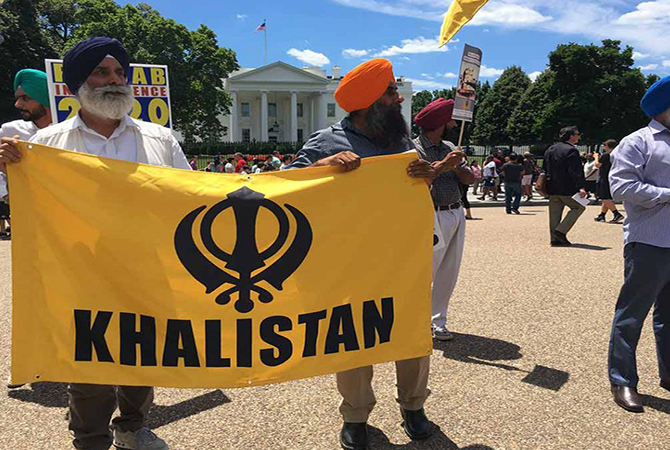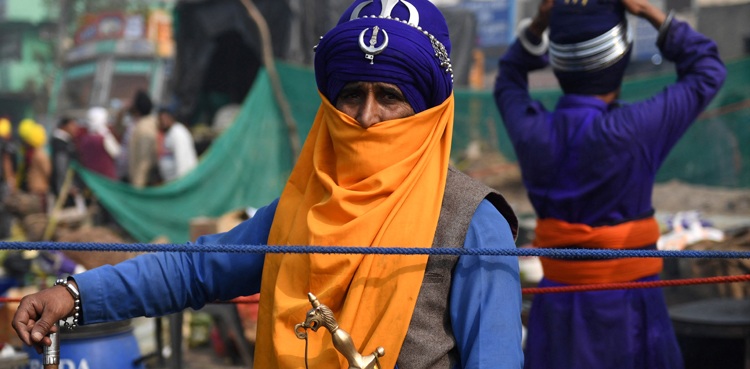Khalistan Demand Alive And Kicking
- By Fahad Ali -
- Apr 05, 2023

As Amritpal Singh has breathed fresh air into the demand for a Sikh homeland called Khalistan, let us take a look at the history and significance of demand.
Sikhs are reputed to be a volatile people inhabiting the fertile plains of north India and are also spread over the globe.
Apart from Muslims and Hindu Marathas, Sikhs were the third race that established their independent empire in the dying days of the 18th century that dominated almost all Punjab, Kashmir and Peshawar.
As an enterprising people they were found in the entire subcontinent but their presence in the military ranks was duly and widely marked. As a sturdy and volatile yet disciplined community they were ranked as one of the martial races by the British when the patterns of recruitment in the British Indian army changed after the mutiny against the British rule in 1857.

Since then the Sikhs became a regular and valued segment of the British military forces and along with Punjabi and Pushtoon Muslims they progressed very well in their chosen profession. The Sikhs were groomed as a fighting community by their religious leaders and they find it difficult to adjust to the overbearing attitude of the majority Hindu community of India.
Owing to their specifically different set of religious and cultural beliefs Sikhs hardly gelled with the majority Hindu community despite professing their similarities with Hindu mythology. They always considered themselves as a separate nation concentrated in a specific geographical location and did want a separate homeland for them.
The call for a separate Sikh state began in the wake of the fall of the British Empire and the first such formal call was given in 1940. The movement for a separate Sikh homeland gained traction with the support of the Sikh diaspora and their demand was to give them the Indian Punjab as a Sikh state.
Their movement flourished through the 1970s and 1980 and burst into crescendo in 1984 with the Indian government stormed the holiest of Sikh shrines in Amritsar to crush the rebellious leaders holed up in there. The resulting chaos ultimately resulted in the then Indian PM Indira Gandhi getting assassinated by her Sikh bodyguard ushering in a bloody holocaust against the Sikhs in India.
Though the Indian government was successful in controlling the Sikh rebellion but it proved to be a temporary respite as the community proved recalcitrant and soon the movement for a separate state known as Khalistan re-emerged that has now become quite a problem for the Indian state.

The Sikhs want a separate state with its boundaries varying as per the descriptions of various sub-groups of Sikhs. Some claim the entirety of Indian Punjab and the others advocate only parts of it be ceded. However larger claims include other parts of North India including Chandigarh, Haryana, Himachal Pradesh and Simla.
The movement has deep support within the Sikh community and Simranjit Singh Mann elected in 2022 from Sangrur is an openly Khalistani MP in the Indian parliament and his party Shiromani Akali Dak (Amritsar) is the only pro-Khalistani party. Moreover, Indian Punjab with about 58 per cent Sikhs and 39 per cent Hindus is the object of Sikh separatism.
Sikhs for Justice (SFJ), a UK-based Sikh organisation has announced a referendum to be held in Indian Punjab, Haryana and Himachal Pradesh for a separate state of Khalistan in Indian Punjab and declared Simla will be its capital.
He said 27 million Sikhs are eligible to vote in the referendum along with releasing a map of the proposed state. Keeping in view the growing unrest the Indian authorities extended a mobile internet blackout across Punjab having about 30 million people. The blackout extension came as supporters of Amritpal Singh were filmed vandalising India’s consulate in San Francisco, not long after similar disturbances in London.
Authorities in the northern state of Punjab launched a major search for Singh who has risen to prominence in recent months demanding the creation of Khalistan.
Singh and his supporters, armed with swords, knives and guns, raided a police station last month after one of the 30-year-old preacher’s aides was arrested for alleged assault and attempted kidnapping. Several policemen were injured in the brazen daytime raid on the outskirts of Amritsar, home to the holiest Sikh shrine, the Golden Temple, increasing pressure on authorities to act.
However, many days after a state-wide manhunt was launched for his arrest Amritpal Singh continued to evade the authorities. Singh has been on a dramatic run since he tricked the chasing police party in Punjab’s Jalandhar district and within 12 hours of the escape, he changed five vehicles.
Initially he was seen inside a Mercedes SUV before he changed the vehicle and his attire. After covering some distance he deserted the vehicle and got on a motorcycle and when the bike ran out of fuel, he got on a diesel-run three-wheeler and then stole another motorcycle.
It is believed that he had already crossed the state’s borders while efforts to locate him remained focused in Punjab over the past six days. The search has now been extended to the states of Maharashtra, Haryana and Uttarakhand along with restricting internet and suspending mobile service.
Described as a menacing Khalistani leader Amritpal Singh appears to have widespread support and his father was declared a fugitive by the Jalandhar administration that also raided his house. It was reported that cases against him and his supporters are filed for their involvement in criminal cases relating to spreading disharmony among classes, attempt to murder, attacking police persons and creating obstructions in the lawful discharge of duties of public servants.
The demand of Khalistan has spread over the Sikh diaspora and its severity could be measured by the fact that the Indian government summoned Canada’s High Commissioner to convey strong concern over Sikh protesters in Canada and how they were allowed to breach the security of India’s diplomatic mission and consulates.
Hundreds of protesters gathered in front of the Indian consulate in Vancouver over demands for an independent Sikh state, a simmering issue for decades recently triggered again. Canada has the highest population of Sikhs outside their home state of Punjab in India. Indian police also opened an investigation into a protest at its High Commission in London, where protesters with Khalistan banners took an Indian flag down from a first-floor balcony of the High Commission to denounce recent police action in India’s Punjab state.
India summoned the top British diplomat in New Delhi seeking an explanation pointing out that there was a complete absence of British police adding that the Indian government finds unacceptable the indifference of the UK Government to the security of Indian diplomatic premises and personnel in the UK.
Videos on social media showed a man taking down the Indian flag on a balcony of the consulate watched by a small group below waving yellow Khalistan flags. India has often complained to foreign governments over the activities of Sikh hardliners among the Indian diaspora who, it says, are trying to revive the insurgency with a massive financial push. By the looks of it the disaffection amongst the Sikhs is predicted to increase and it may spill over to other areas of India.
The Modi government is trying hard to control the growing Khalistan demand but it appears that it may not be an easy task at all.
Disclaimer: The views expressed here are solely the author’s and do not necessarily reflect the opinions and beliefs of ARYNews or its management.
